Jerusalem. Doha. Charlie Kirk. Western Civilization:
We are skidding so, so far off the rails.
Editor’s Note: I am on the road for a month; vacation, visiting family and work-related stuff. My travels have taken me to the places highlighted in the title and more. I’ll be back in Israel for Yom Kippur and October 7th.
I was last in North America for an extended visit in March and April, 2025. Things have changed. A lot. And not for the better. My hometown, Toronto, is a mess. Law enforcement has abdicated and given free rein to the Free Palestine crowd and anyone on the “progressive” extreme left. Our streets are often blocked with people yelling about the imperative of destroying Israel. Some are aligned with terrorist ideologies which are banned by law in Canada. But that doesn’t seem to be a concern for Toronto Police - the fourth largest force in North America. One of Metro’s Finest (as we used to call them when they actually engaged in law enforcement) told me that whether the speech was inciting hatred and violence was a matter of “perception.”
As I write this on Sunday morning in Florida, I learn that Canada has just recognized the State of Palestine.
The action speaks for itself. I have written about that often in the last few months but will have more to say soon. I am not at all surprised but I am disgusted. Canada’s Prime Minister, Mark Carney, has been champing at the bit to give Israel and the Jews the comeuppance he seems to think they deserve. Privately, he is indiscreet regarding his contempt for Israel and PM Netanyahu. (I have never met Carney but his sharp comments on the subject are made freely with many. So, sure - consider this comment informed hearsay.) And by rewarding Hamas with recognition of a Palestinian state, Carney emboldens their thuggish acolytes in Canada.
Canada is not a safe place for Jews. And PM Carney does nothing to address that. His much-lauded new legislation criminalizing hate-related activity interfering with religious worship is useless. Jews are harassed and targeted - often violently - not just going to synagogue, but going grocery shopping. Walking in their neighborhoods. Living their lives. PM Carney is silent on that. He has never spoken out against such conduct nor does his new legislation address it. He is throwing Canada’s Jews to the dogs.
Amid the chaos swirling around us I hope that we can all pause in the coming days. It is not a “happy” New Year in my world. But I do have much to be grateful for and will focus on that. Most importantly, I am free and in good health, which allows me to use my voice to advocate for those who cannot.
Wishing you all good health, fulfillment and meaning in the coming year. May we find ourselves - as a people, nation and global community - in a saner place, soon, than we do today.
What I wish for us all is clarity and honesty. That we face the time we are living in with honesty and courage. That we are granted a brief respite in Israel, to breathe.
This is not a Jewish crisis. It’s a western crisis.
I was quiet last week on this platform (in writing, that is).
Aside from writing one column for the National Post on the Israeli attack on Qatar (which you can read here), I chose to wait on so many other topics. The pace and intensity of events was overwhelming.
And there was a rush of immediate and extreme reactions to a series of events.
Reflection felt more appropriate for me. I did not want to join in the cacophony of rage, despair or the incomprehensibly stupid exchanges that now pass for public discourse. The week before last was extraordinary.
Then again, it wasn’t, which says so much. Extreme violence and conflict - physical and verbal - are becoming more….regular. What might have shocked us a decade ago is becoming more…..normal.
Monday, September 8. A vicious terror attack in Jerusalem.
Tuesday, September 9. An Israeli attack on Hamas leadership in Doha.
Wednesday, September 10. Charlie Kirk assassinated at a daytime event in Utah, his wife and young children present in the audience.
Kirk’s murder, I believe, shocked many to their core, reflecting a new level of evil.
His death has also become a ghoulish opportunity for many. Some are poised to attract his millions of “followers” to their camp. Others have very determinedly set out to lie about who Kirk was and what he said, and did not. There used to be a sense of dignity and grace in the immediate aftermath of such a dreadful event. No longer. The digital age compresses everything.
Kirk’s murder also opened the sluice to a flood of hateful screeds. Social discourse is not just a gutter, it’s a murderous one. No decency and less shame. So many haters exposed their moral depravity publicly. Proudly and loudly.
But when they were exposed - primarily on social media - there was often a fierce backlash. Those who had so freely maligned everything about a young man just murdered came to realize that their glee was not being well-received. Suddenly, many of those same people - shamed by public criticism - experienced spontaneous epiphanies and moral conversions.
A torrent of sanctimonious apologias ensued, which were offensive mainly because of their disingenuousness. So much frantic backpedaling: “Oh. I didn’t mean thaaattttt.”
But, they did. Until they were censured.
At the risk of stating the obvious, we are a society beyond decline. We are self-immolating and don’t seem to realize it. In the immediate wake of this brutal murder the vitriol that was spewed was alarming. It evoked the unhinged Jew hatred that erupted on October 7, when people around the world celebrated the slaughter of Israelis as it was ongoing. They could not contain their joy.
It was similar with the murder of Charlie Kirk; no matter what your political views may be, such violence should horrify every decent, freedom loving person. Everywhere.
We have cultivated an environment (largely due to social media) where anonymity is acceptable, with the attendant consequence that accountability is rendered obsolete. But when one’s identity is exposed - as occurred often last week - suddenly a moral conscience develops.
Among the more disgusting posts about Charlie Kirk was one by the horror writer Stephen King – who gets credit for using his own name. But that’s because he seems to think himself infallible. Every brain cramp merits amplification.
King’s ugly attack on Kirk prompted a fierce backlash.
“Oops.” The great man stumbled. “I didn’t mean thaaaatttt.”
His climbdown fell flat, because it was insincere and only offered once he realized his comment was not well-received.
The Kirk assassination caused a tsunami of horror and disgust, and not just from conservatives. A massive march in support of free speech in London on Saturday doubled as a tribute to the murdered young leader. Throughout North America vigils popped up, attracting tens of thousands. This is no longer about partisan politics. It is about the foundations of western society; which are eroding, very quickly.
The evil that murdered Charlie Kirk was yet another dreadful moment in a Very Bad Week in my bubble, which tends to focus on what’s going on with Israel, Jewish life and Canada and the U.S.
Dramatic doesn’t begin to capture the intensity and deeply concerning fallout that remains unclear.
Monday, September 8
I flew from Vienna to Toronto, following what was meant to be a ten-day decompression holiday in Austria with my daughter. We needed a break from the constant tension of living in Israel. Mountains and freshwater lakes were the perfect antidote.
Lakeside, St. Gilgen, Austria
Vienna is a magnificent city; Salzburg – perhaps even more so. It is breathtakingly beautiful and everything is so easy. Parking a car. Going out to eat. Everyday things. We also spent a few days in St. Gilgen, a charming lakeside village about a half hour from Salzburg. Postcard perfect.
City Hall, St. Gilgen, Austria.
Before landing in Vienna we discussed how we were going to deal with the usual travel questions, like: “Where are you from?”
When one lives in Israel the truth is not always the best response. So, we agreed on loose parameters for how to handle these situations. At times, my daughter expressed anger at being “forced to lie”, as she saw it. I viewed our conundrum differently. We were being wily and thinking one step ahead: not lying as much as managing our various truths. We are Canadians and Israeli. Fact. Nothing requires that we disclose everything in all circumstances, especially when it comes to our personal safety.
On the few occasions where we chose full disclosure – which were rare – we were surprised by the immediate and positive reactions; from Austrians – who are not known for their warmth. Without mentioning certain verboten words, they conveyed to us, in code, their deep dissatisfaction with what was transpiring in much of Europe and elsewhere.
Austrians have seen a significant uptick in the Muslim population in their country in the last decade. Of 9-million people in Austria in 2021, 8% were Muslim. Projections are that by 2050 the country will be 20% Muslim.
In light of these demographics, we were surprised to not see a single kheffiyeh, or “Free Palestine” protest, or even a flag.
We also noticed that many women wearing hijab or abayas – the full-length black bag-like cloth that covers women from head to toe, revealing only their faces – were also sporting medical masks. At one gas station a black van with tinted windows pulled up. The male driver stepped out and opened the rear door. Many children spilled out, along with four black-robed women with matching black cloth “medical masks.” It was a bizarre scene. I would surmise that the man had more than one wife in the vehicle.
They wore face masks because of a law passed on October 1, 2017, in Austria banning the wearing of niqab (the attire that covers all but a woman’s eyes) or burqas (the garment that fully hides the woman and also features cloth mesh covering her eyes. When passed in 2017, the Anti-Face Veiling Act was explained as a law intended to promote interpersonal communication, which – the government stated - is necessary for peaceful communication in a democratic, constitutional state.
Pedestrian bridge, Salzburg, Austria
In the immediate aftermath of the introduction of this law – women sporting burqas or niqab in Austria were forced to remove the face coverings, in public. Indignation was sharp. Islamophobia, many said. The Austrian government did not relent.
Eight years on, the local Muslim population has managed a workaround. For now. But, as you can see in the photograph, above, there are outliers who continue to defy the law. And every so often there are highly publicized arrests, sparking yet another cycle of indignation alleging Islamophobia. But Austrian law enforcement seems to be holding firm.
It is also a country that has done some reckoning with its Nazi past. We heard very divergent views on that issue. Some say that it is glossed over and that Austria tends to prefer a narrative in which they had no choice but to submit to the will of Germany. Others are of the view that Austrians were enthusiastic hosts of the Third Reich and turned on their Jewish compatriots - who were very assimilated and prosperous - with zeal.
Placed in a central parkette, near the Opera House and landmark home of the Sacher Hotel and famous torte, is this statue of an elderly man. On his knees, scrubbing the pavement, he is a symbol of an event that occurred in that same park on April 23, 1938, just one month after the Nazi takeover of Austria, known as the Anschluss. Jews were randomly grabbed, beaten, made to run in circles until they collapsed, and then forced to scrub the street and sidewalk while being jeered at by their neighbors and uniformed Nazi soldiers. Some were made to eat the grass, as cows would do. Many died from heart attacks in the midst of the torture, as their neighbors laughed with abandon. It was entertainment.
Sculpture of a Jewish man scrubbing the streets in Vienna
The massive stone sculptures surrounding this humiliated man shown scrubbing the pavement are from the stone quarry of the Mauthausen concentration camp, not far from Vienna and reputed to be among the very worst of the worst. Those unlucky to have found themselves in Mauthausen were worked and tortured to death by particularly sadistic Nazis.
Almost no one survived Mauthausen and today, Austria’s once robust Jewish community of 190,000 is now approximately 8,000.
The Very Bad Week
Monday, September 8
In the morning, before boarding my flight from Vienna to Toronto, I was aware of the rush hour terror attack earlier that had targeted civilian bus passengers in Jerusalem. Two gunmen opened fire on the crowded bus, murdering six, critically injuring six and wounding scores of others. Hamas was quick to take credit for the carnage, infuriating Prime Minister Netanyahu.
He assembled Israel’s top intelligence and security officials to discuss whether to launch a military operation to kill four top Hamas officials who were gathered in Doha, Qatar to discuss how to respond to the latest ceasefire and hostage agreement agreed to by America and Israel. Of course, we did not know that until it happened, on Tuesday.
Tuesday, September 9
The Israeli Air Force bombed a building in an upscale neighborhood in Doha.
Four senior Hamas officials were targeted. Their chief negotiator was among them.
Early reports on Al Jazeera from Doha were confused. Shortly after a total news blackout was imposed.
Qatari Emir Tamim bin Hamad Al Thani raged that his country would no longer mediate between Israel and Hamas to negotiate a ceasefire and the return of remaining hostages.
Then he is reported to have said that he would review all security arrangements between Qatar and the United States.
He made it clear that he trusted no one.
Did the White House have advance notice of the attack? Yes, no, maybe, depending on who one asked and when. America’s largest military base in the middle east is in Qatar, meaning that the U.S. effectively controls Qatari airspace. It is simply not credible to posit that the U.S. was not aware of the Israeli air incursion. The real question is when they learned of the planned attack. Did they have advance knowledge or just a few minutes, as the White House has suggested?
Two days after the attack it became clear that the operation had failed to hit the intended targets, instead killing a number of lower-level Hamas operatives and bodyguards.
PM Netanyahu was pugnacious, insisting that the attack was justified, nevertheless. Qatar and many countries were apoplectic that Israel would so brazenly violate the sovereignty of a peaceful, third country that just wanted to help.
And that, perhaps, is the real farce; that the world continues to pretend that Qatar is a rational country. An “ally” of the west.
Qatar is the main global sponsor of Islamist terror, financially and diplomatically. Hamas leaders have long found sanctuary in Doha. Their jihad to destroy Israel is financed by Qatar. They live, work and flourish financially in Qatar.
As one person commented last week on “X”, the Qataris are the Houthis in fine suits.
A second rather important issue is that many consider the attack ordered by the Netanyahu government to have been reckless. Longtime Netanyahu loyalist and hawkish National Security Adviser, Tzachi Hanegbi, refused to “green light” the Qatar attack. Furthermore, neither David Barnea, head of Mossad, nor IDF Chief of Staff, Eyal Zamir, supported this operation. Barnea had reportedly given his personal word to the Emir a few days earlier that Israel would not attack on Qatari soil.
Also in the mix is the fact that Israel was in the home stretch of the umpteenth hostage negotiation. Yes, there was reliable intelligence that Hamas was not going to accept the terms put forward by America and Israel (confirmed to me by a number of sources with direct knowledge of the issue). But that was expected. Hamas has no reason to surrender their major asset - live hostages.
But - what, exactly, would the Doha attack accomplish? On what planet would that operation - even if successful - have resulted in the release of the hostages? Conducting the operation presumed that the targets and their accomplices would react in a rational manner. Meaning - in this warped context - Qatar and Hamas would finally see the light and order their thugs on the ground in Gaza to let the hostages go.
But - why would they do that? Netanyahu and his cabinet understood that either way - successful or not - the attack would humiliate Qatar.
The Emir said that his country had been betrayed. Israel’s official position is that the attack establishes its determination to hit Hamas wherever it goes. As Netanyahu commented in the aftermath, Qatar should bring Hamas leadership to “justice.”, warning: “If you don’t, we will.”
Israel took a calculated risk that played to the coalition government’s extremist base but reflected highly questionable judgement.
As one senior intelligence officer reportedly said in high level meetings last week: “We can get them (Hamas leaders) in a year. Two. Why now?”
(That patient, stealth approach is more consistent with the Mossad’s way of working.)
Perhaps something could have been worked out that would have saved the lives of some or all the hostages. Now? All bets are off.
In my view the Doha attack ensured that the preferred outcome - a release of all hostages - would be more remote than ever. Now it seems that even a partial deal may be doomed.
And then there is the not insignificant fact that in light of Mossad’s refusal to support the misadventure, Netanyahu turned to the Shin Bet (Israel’s domestic security service) to manage the operation. This is extraordinary. All covert operations of this nature are supported by Mossad. By law. And for good reason. Mossad has the expertise required to operate in foreign countries. Shin Bet does not. And it showed.
In the immediate aftermath of the Doha fiasco and to this day, Netanyahu is unyielding. The operation did not fail, he declared last Monday during the visit to Israel of Secretary of State Marco Rubio, because it sent a message to Hamas and Qatar. Presumably that message is one of deterrence, in Bibi’s mind. Many others interpret it as yet another instance of Netanyahu’s detached leadership.
Since the Iran war in June in particular, Netanyahu has openly praised himself as a peerless leader, placing himself squarely in a grand, historical, millennial arc. Towards the end of what was ultimately a joint Israeli American offensive intended to cause maximum damage to Iran’s nuclear weapons capability, Netanyahu gave a rare interview to an Israeli television reporter, Ayala Hasson. He was bellicose, boasting of taking his place in history, bookending, if you will, the leadership of Persian King Cyrus - known as Cyrus the Great - for having emancipated the Jewish people living in his kingdom and bestowing upon them equal rights and status. “And now,” Bibi beamed, “we have come full circle. I can liberate Persia.”
The quote is not exact but is true enough to the substance of what Netanyahu said at the time.
Now, as Israel is increasingly vilified and isolated in the aftermath of the Qatar attack and the IDF’s ongoing pounding of Gaza, Netanyahu said recently that Israel will become a “Super Sparta”, invoking the ancient Greek city state feared for its power, military prowess and economic self-sufficiency. This declaration came in a week when the EU (Israel’s major trading partner) threatens to suspend all trade agreements, and countries worldwide are imposing arms embargoes.
Sparta? Seriously?
Netanyahu attempted to walk back that warning. But he did not misspeak.
Israelis find Netanyahu’s conduct deeply concerning.
Wednesday, September 10
Wednesday. I was in Toronto to see friends, family and attend the screening of the film, “The Road Between Us,” documenting the impossible rescue of Israeli journalist Amir Tibon and his family by his parents on October 7.
Amir and his wife Miri huddled in the safe room of their home on Kibbutz Nahal Oz (one kilometer from the Gaza border) for hours as terrorists attempted to break in. Shooting, shouting in Arabic, pandemonium and savagery were everywhere. His father – a retired IDF General – and his mother (an academic, former school principal and teacher) went headlong into the heart of darkness to rescue their family.
The film was accepted to premiere in the prestigious Toronto International Film Festival, until it wasn’t. On August 12, TIFF management had a change of heart and decided to pull the film. The reason given – and explained on August 13 in an industry publication, was not credible:
A TIFF spokesperson tells '“Deadline” on Tuesday, “The invitation for the Canadian documentary filmThe Road Between Us: The Ultimate Rescuewas withdrawn by TIFF because general requirements for inclusion in the festival, and conditions that were requested when the film was initially invited, were not met, including legal clearance of all footage. The purpose of the requested conditions was to protect TIFF from legal implications and to allow TIFF to manage and mitigate anticipated and known risks around the screening of a film about highly sensitive subject matter, including potential threat of significant disruption.”
(The full article can be read here.)
Reactions were swift, furious and focused on this being yet another example of rank antisemitism.
I awoke to this flurry of anger in Israel and thought that the discussion was off point. And so, I posted this to X:
In quick succession, TIFF management reconsidered and assured the public that the film would, in fact be shown. As it turned out, there was one screening held under tight security, on Wednesday, September 10.
It was in the magnificent Roy Thomson Hall, with a capacity of just under 3,000 and home to the Toronto Symphony. The event was grand. The film was riveting and gutting.
In the aftermath, former journalist Lisa LaFlamme, hired to moderate a Q and A with the Tibons as well as the film’s producer and director, felt it necessary to ask them to comment on what she termed Israel’s “excessive use of force in Gaza.” It was a particularly distasteful moment in light of the fact that it had been agreed, beforehand, that “politics” would be avoided. This was, as the Tibons said repeatedly, a story about family, loyalty and the horror of that day. LaFlamme’s gratuitous insertion of her views was unprofessional and not at all well-received by the audience.
I filmed on my phone the full post-screening discussion, primarily so that I could send it in real time to their son, Amir, who was not able to attend. I get no kudos for cinematography but, as I was rewatching the segments to find the LaFlamme moment, I could not stop. It is a fascinating discussion about the making of this important film and what transpired on October 7. The rescue by Noam and Gali Tibon of their family and so man others is beyond heroic. So - I include all the clips here. Some of you may find them interesting. They’re raw and in chronological order. Clip 3 at 2:00 is where LaFlamme veers into condemning Israel for “overwhelming use of force resulting in over 64,000 Palestinian deaths.” It was wrong. And you can hear the audience reaction.
Note also that in her windup, LaFlamme refers to Gali having said in the film that there has been an element of revenge in the Israeli response post October 7. As she makes this observation, you can see Gali Tibon flinch briefly, and Noam turns to look at her, knowingly. This was not supposed to happen. But Gali handled LaFlamme’s classless question so elegantly.
1.
2.
3. Lisa LaFlamme’s controversial comment begins at 2:02.
4.
When we exited Roy Thomson Hall at around 4:30 pm there were knots of people and the same name was repeated everywhere, in varying tones.
Charlie Kirk
Charlie Kirk had been shot. Charlie Kirk had been what?!?
In that moment, it was unclear if he was alive, and the truth was confirmed shortly after. The extraordinary aftermath of his murder is, I believe, only just beginning.
Today, of course, is his funeral. And State of Tel Aviv will be brinigng you a special podcast episode on Monday morning EST; reflections on Charlie’s life and death with his good friend, Josh Hammer, who spoke with him at length on the night before his assassination.
The Aftermath: September 11, 2025 to the Present
Since the Qatar fiasco of Tuesday, September 9, Netanyahu has one day boasted of the strength of the economy, the next conceded that it is being battered.
Shouting matches between the IDF Chief Eyal Zamir and PM Netanyahu (supported by several of his extremist coalition colleagues) have come to characterize cabinet meetings. Zamir has made no secret of his disagreement with the Gaza operation, saying that it will accomplish nothing but likely cause the deaths of the remaining hostages.
Minister of Strategic Affairs, Ron Dermer, reportedly told Zamir that his judgement has been wrong previously, like when he opposed any further military action in the Gaza Strip. Had that not been undertaken, Dermer asserted, there would be no hostage deal on the table, as there is now.
“Then take the deal”, Zamir thundered in response.
Highly unlikely.
Netanyahu now stands firm in saying he will only accept a release of all hostages at once. Or nothing. His position does two things: it significantly increases the possibility that they will all die in Hamas captivity and that the war will go on indefinitely.
Many Israelis believe that Netanyahu wants just that, ensuring that he remains in power. In yet another interview with an Israeli reporter, Netanyahu responded to accusations that he is acting in his personal interest as “malicious” and “untrue.” The level of public trust in his government and leadership is plummeting and reflected in poll results, consistently.
There is no way to “win” this war.
After the horror of October 7, it is all about mitigation. Two years on, Israel has not brought home all the hostages. We have not destroyed Hamas. The IDF Chief of Staff is saying publicly that this latest Gaza City operation is ill-advised. Adequate infrastructure to meet humanitarian needs among the civilian population in Gaza are not in place and operational. Furthermore, Zamir is alerting the Israeli public to the fact that the Netanyahu government has not shared any plans with the IDF as to what the political echelon intends to do in and with Gaza, once the fighting stops.
This ongoing failure to articulate goals – other than in the broadest, most jingoistic terms – and has led to a sharp decline in morale among the famously resilient Israelis.
Perhaps more importantly, they no longer trust and believe those who purport to lead them. They no longer see them as being committed to doing what is best for the country but, rather, what is most advantageous for them, politically.
How does this hurried attack on Gaza City help Netanyahu politically?
It keeps alive the fantasies of coalition extremists, Itamar Ben Gvir and Bezalel Smotrich, who have grand ambitions to occupy and settle Gaza. Ben Gvir spoke this week of building a “luxury neighborhood for Israeli police officers on the ruins of Gaza.”
This is the senior leadership in Israel. And they have been emboldened and promoted by Benjamin Netanyahu.
The moral fibre of the nation is more important than any political party holding power.
The moment Bibi ends the possibility of occupying Gaza, these two coalition members would bolt, leaving the government very vulnerable. And so, Bibi indulges their policy goals, which means that the war continues.
Since arriving in North America, I have been asked repeatedly why Israelis are opposed to the Gaza offensive.
For those of us living there, the war is very real. And this war is no longer perceived to be justified. We must bring the hostages home. End the fighting. And prepare for the next round. Twenty years of Netanyahu’s much lauded and now maligned “containment strategy” gave Hamas the time and money to build a massive war machine. Underground. The IDF cannot destroy this without international diplomatic support.
Slogans are effective but only for so long.
“So, what do we do?” I am asked, constantly. “Do we leave Hamas standing?”
I often suggest that continuing to fight, when the country and its people are depleted and domestic tensions are intensifying, is not the answer. We must coolly assess our capabilities, pause and regroup. No one in Israel intends to allow Hamas to carry on unbothered. But we are all questioning the wisdom of soldiering on in the present circumstances.
But many of those I have encountered are hawkish and don’t accept that Israelis have limits. They are strong and infallible; that is the myth that has become entrenched since 1948. That we cannot be beaten.
So, I switch tacks.
“Send your sons and daughters to fight.”
After 90 days of basic training they can be ready to deploy in Gaza. Few, it seems, are aware of this.
Invariably, that suggestion hits a nerve. Because it makes the war real in a way it hadn’t been a few moments earlier. And invariably, they just look at me and say nothing.
Which says everything.



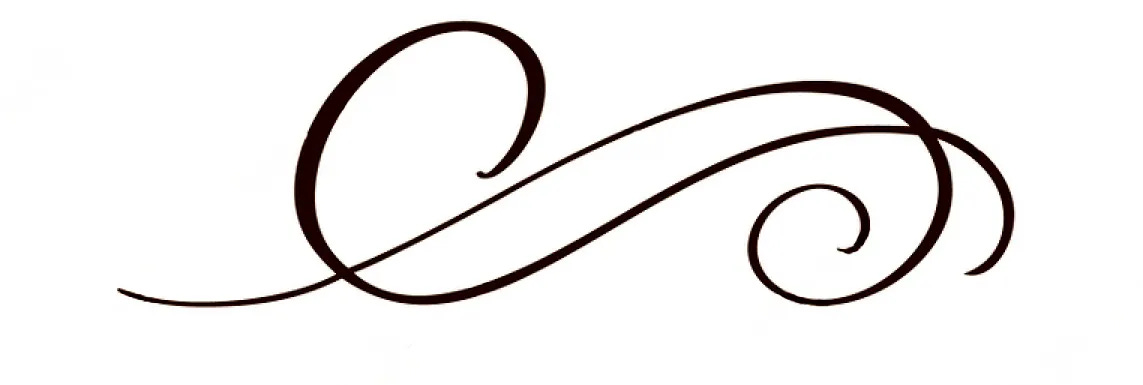
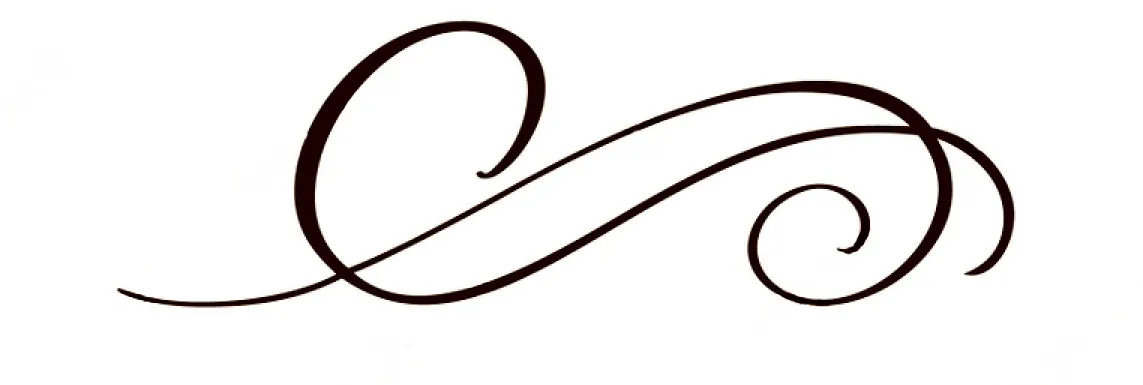

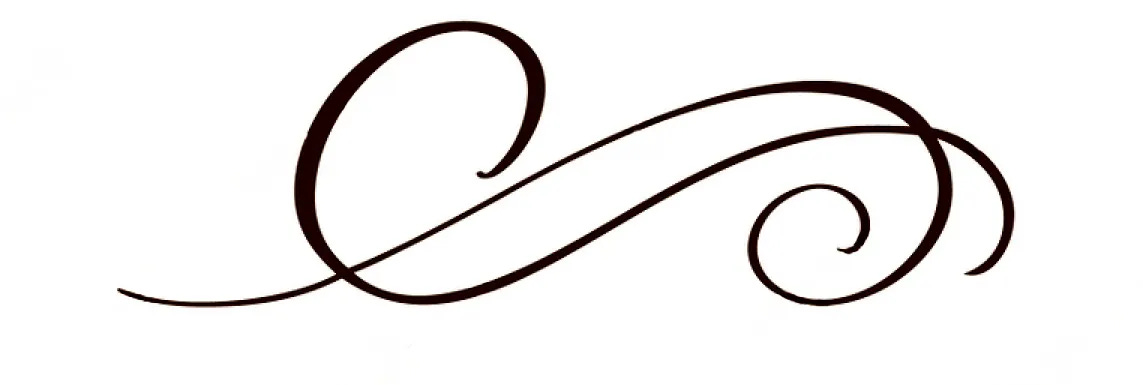
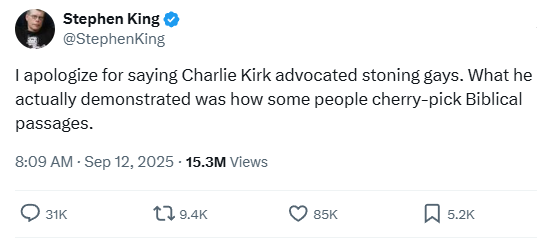
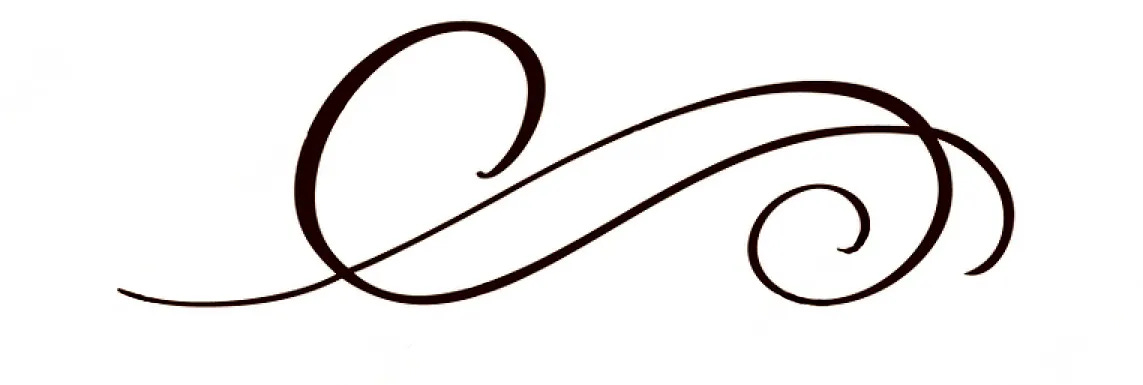
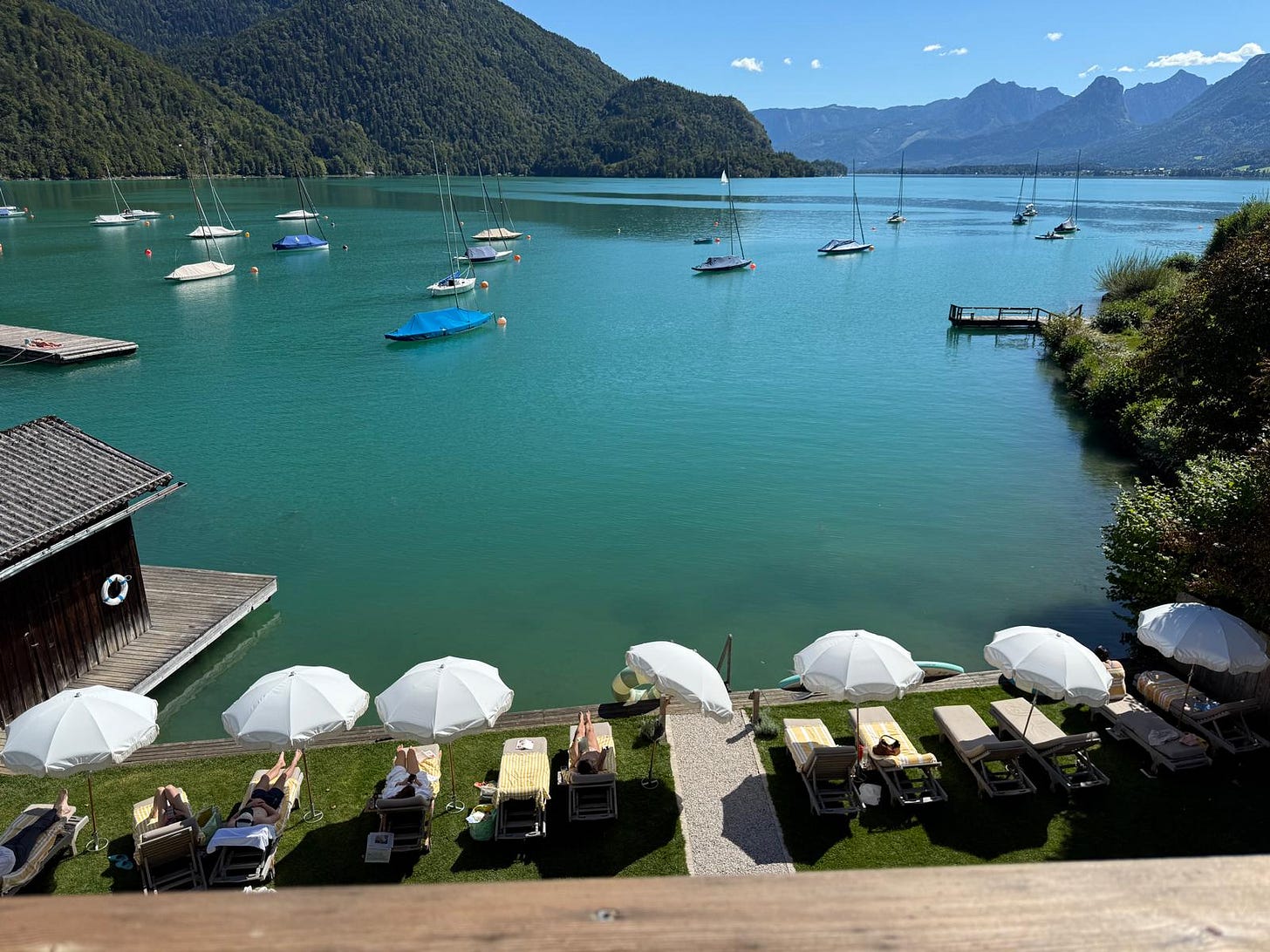

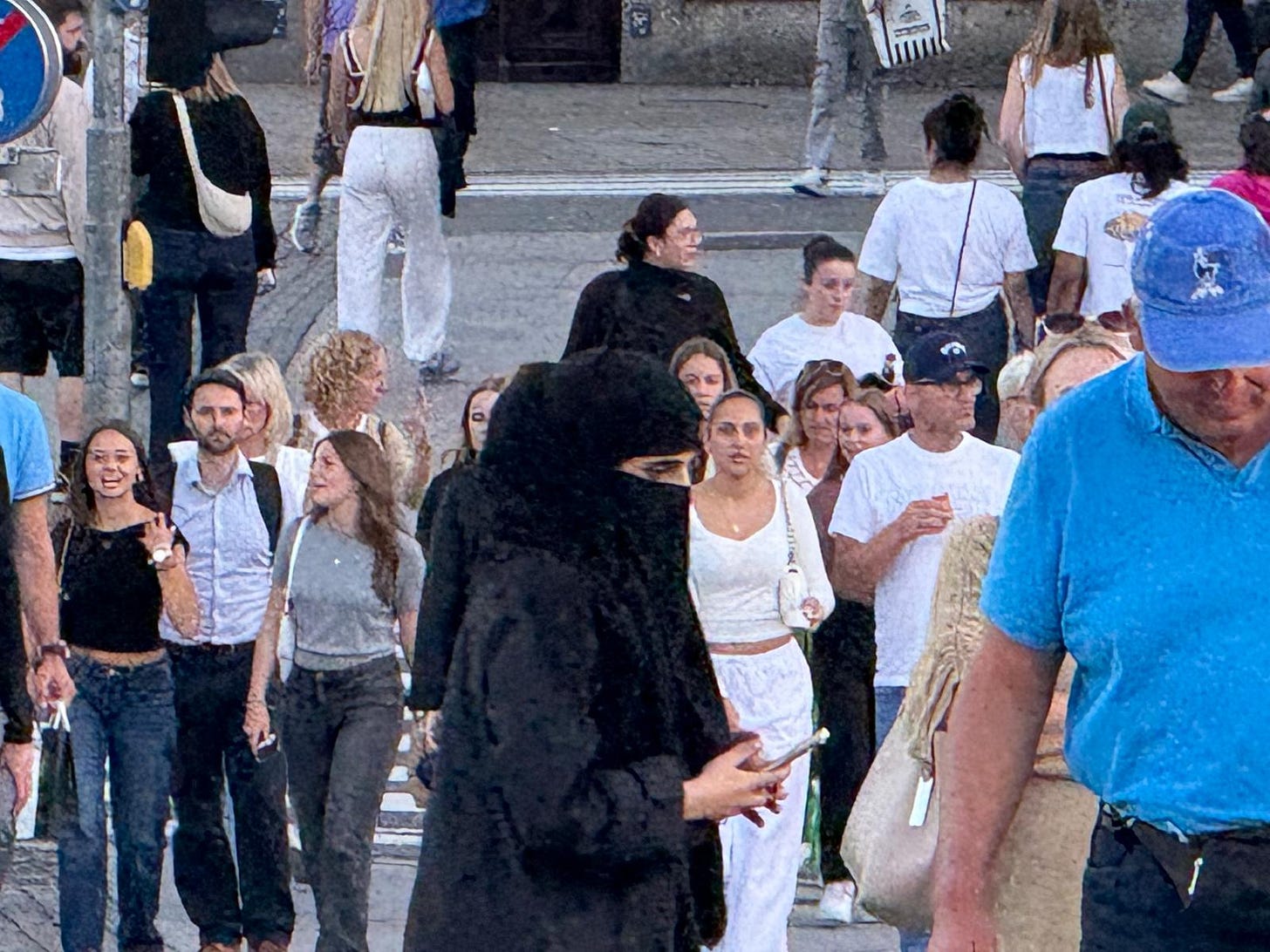
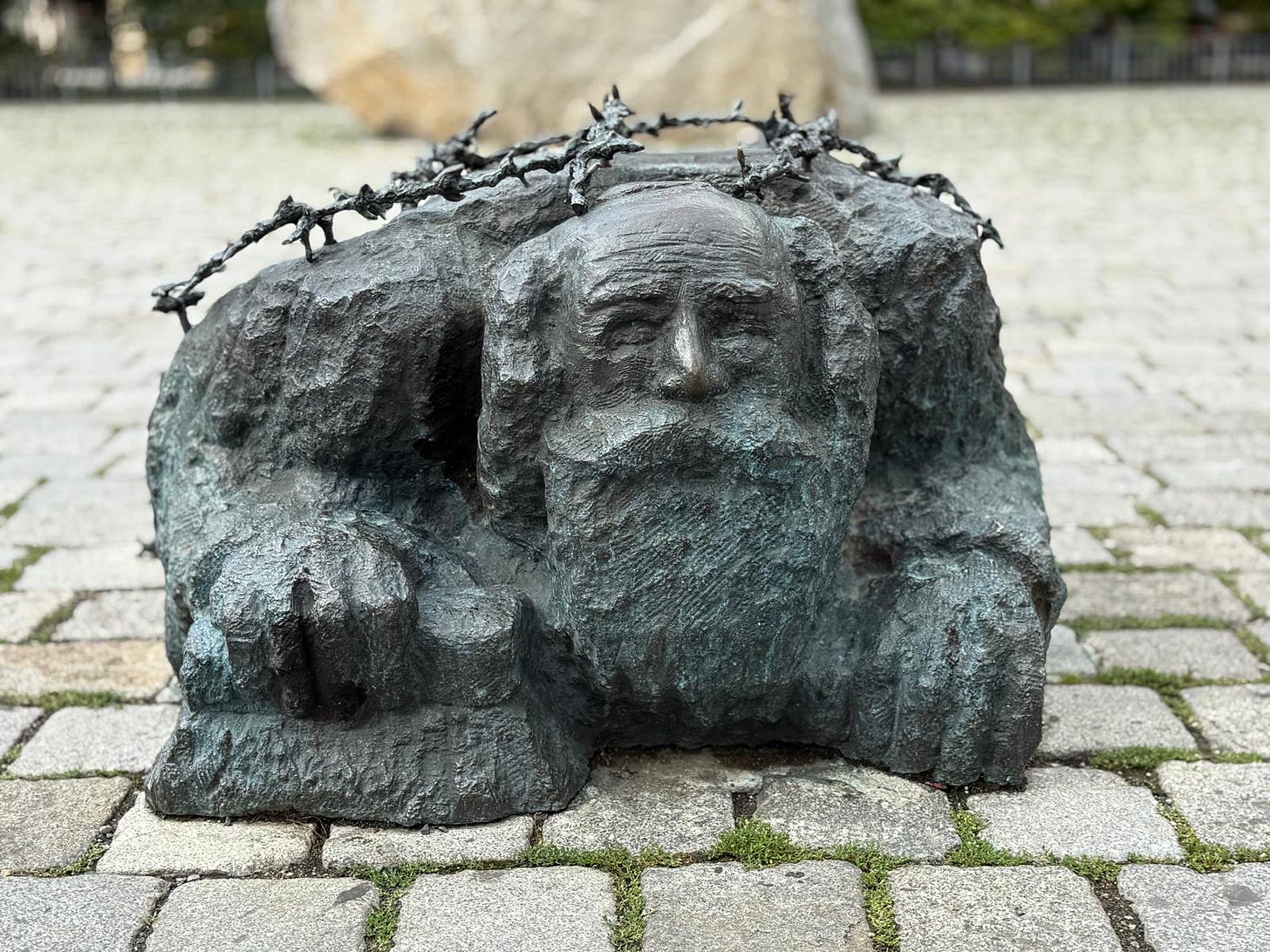
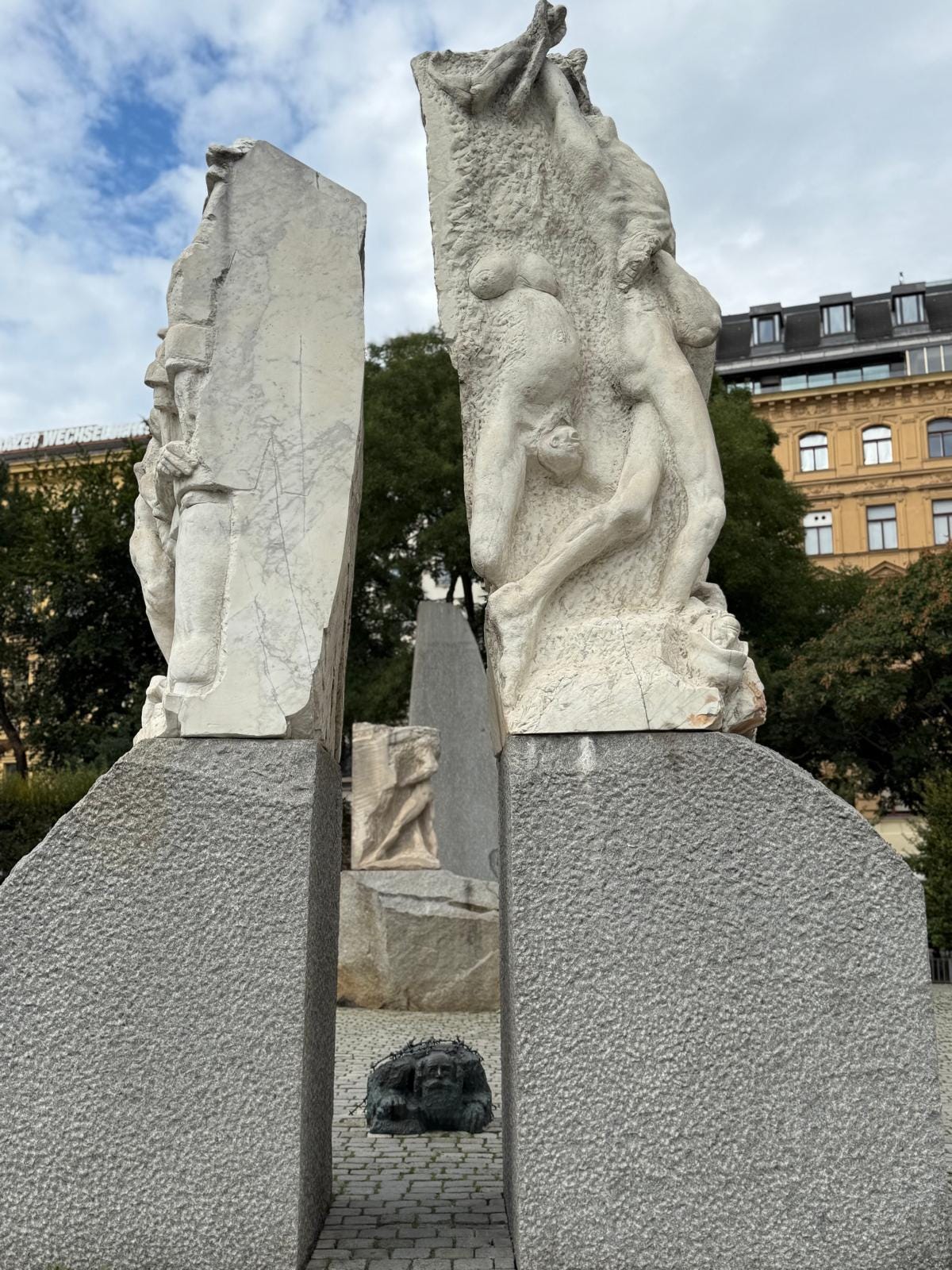
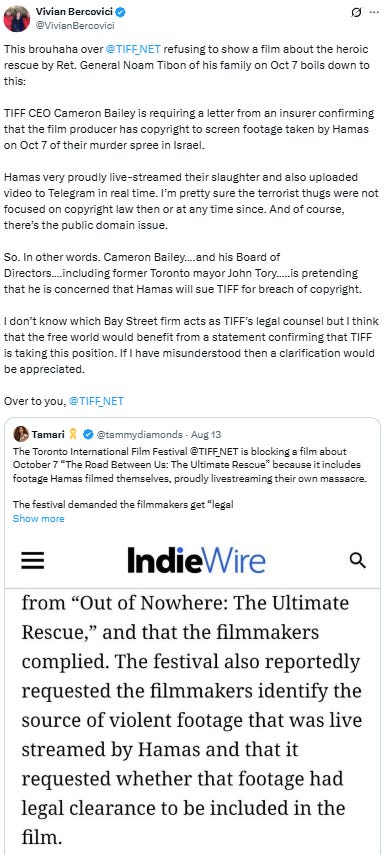
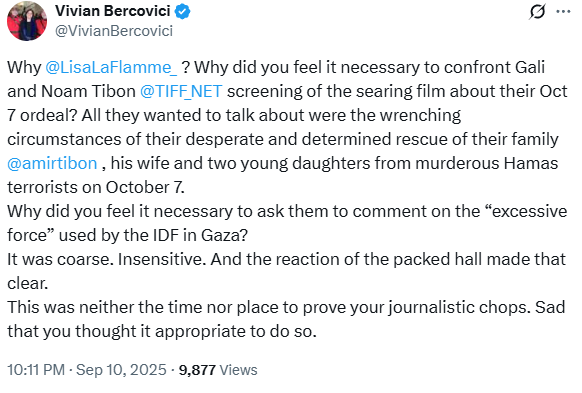
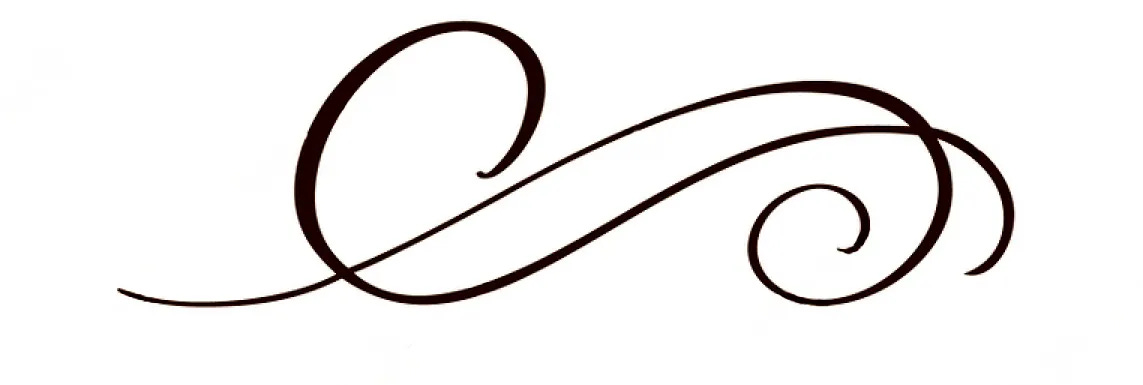
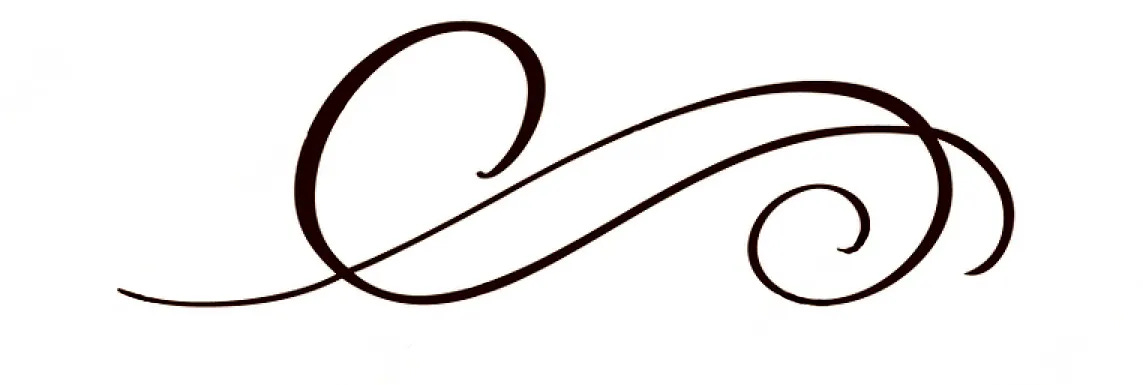
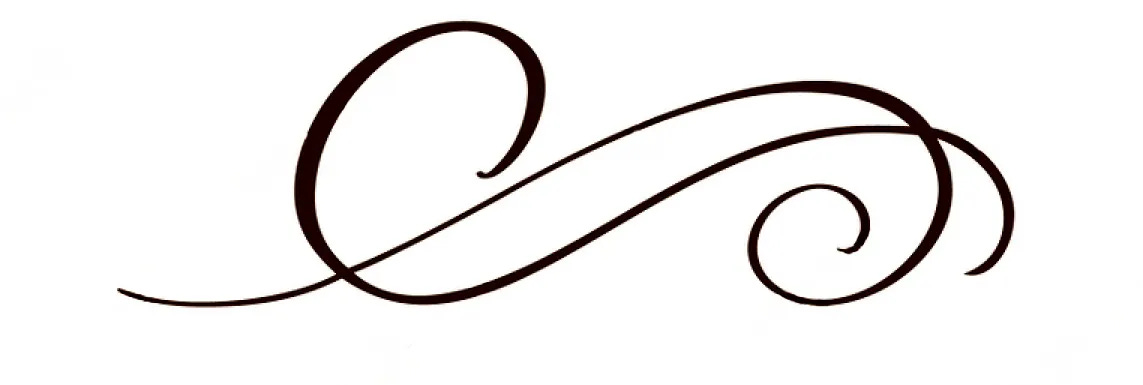
Another brilliant article Vivian.
Yes it was a horrible week and today’s announcement from the morally bankrupt countries of the West recognising the non-existent State of Palestine made today, right before our New Year speaks volumes. What it shows me is that the West hasn’t learned its lessons and the old Jew hatred is alive and well. Starmer isn’t another Neville Chamberlain, he’s worse because Arab terror and jihad has been around for decades. They have no excuse. This is a betrayal to the Jewish people in Israel and the Diaspora. You forgot to add the pathetic Emmy’s to the list with woke useful idiot stars wearing the bloody hand pin, boycotting Israeli artists because their ‘complicit’ in the fake genocide and as a Jew Emmy winner Hannah Einbinder’s cringe address throwing Israel under the bus saying Gaza was close to her heart and Free Palestine. Could anything be more vomit inducing?😼 This from someone who attended Beverly Hills High-school with Persian Jews whose families had escaped the mullahs to America and Israel to live free as Jews. It beggars belief. My Israel American friend sent me video of her son, a lone soldier being inducted into the Iran Dome combat unit. She was very proud and I keep him in my prayers twice daily. I pray this war ends soon and the hostages be they dead or alive come home so the families have closure. I pray for the peace of Jerusalem and the Jewish people and for new elections, accountability and new leadership. I want to make Aliyah, G-d willing with my dog next year. Once again thank you Vivian for all the great work you do it is very much appreciated and happy belated Birthday. Glad you and your daughter got to decompress and spend time in a beautiful place. My English BD is on Tuesday, first day of Rosh Hashana. G-d Bless and Keep the Faith🐺💪🍯🍎🍷🇮🇱